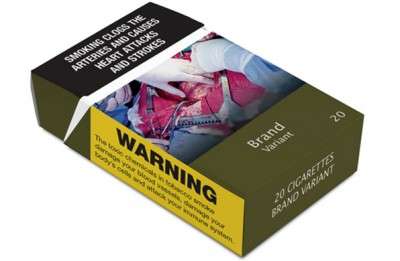Investigation lifts lid on big tobacco's campaigning methods

New research by academics at the University of Bath reveals the scale of lobbying against the introduction of plain packaging of cigarettes by bodies with links to the tobacco industry, and shows how low levels of transparency led to 'a misleading impression of diverse and widespread opposition' to the ban on logos and brand imagery that came into force in May.
The study, published by the health journal BMJ Open, highlights how tobacco companies funded opposition to the new policy by individuals and organisations – with the linkage frequently not disclosed publicly - during a three year period.
It highlights the difficulties of implementing Article 5.3 of the World Health Organization (WHO) Framework Convention on Tobacco Control, the aim of which is to protect policy-making from lobbying by the tobacco industry. The 180 nations that signed up to the treaty are meeting in India next month and are being warned by the WHO that there are 'growing signs that the tobacco industry is attempting to interfere' with its work.
Researchers from Bath's Tobacco Control Research Group, as well as Aston University, set out to discover how much opposition to plain packaging could be traced back to tobacco companies, and to find out if this activity was transparent in making public a connection with the industry.
Direct financial links
Over 400 pieces of activity from 2011 to 2013 were tracked, the vast majority found on the internet and in material that was already public. Three-quarters of the 109 organisations outside the industry itself whose activity was analysed had direct financial links to one or more of the big four tobacco companies – British American Tobacco, Imperial Tobacco Group, Japan Tobacco International and Philip Morris International. These 82 organisations were responsible for 60% of the anti-plain packaging campaigning identified.
The study, funded by Cancer Research UK and supported by the UK Centre for Tobacco and Alcohol Studies, found that organisations which actively opposed plain packaging (including campaigners and business groups) rarely reported any relationship with tobacco companies transparently. Of 150 examples of public communications, less than a fifth acknowledged the link.
Although research bodies commissioned by tobacco companies (including academics and consultancies) were almost always transparent in disclosing their connection, many campaigning groups then used their material without acknowledging who had financed the work.
More information on the research findings and the organisations examined in this study can be found on TobaccoTactics.org.
Dr Jenny Hatchard, of the University of Bath's Department for Health, explained 'Our findings illustrate the challenge facing governments in meeting their commitments under the global treaty. Troublingly low levels of transparency make it hard for governments to detect vested interests at work, creating an impression of wide-ranging opposition to policies which have the potential to reduce smoking, a habit that costs six million lives worldwide every year.'
Delaying policy implementation
Professor Anna Gilmore, Director of the Tobacco Control Research Group, commented: 'The tobacco industry's credibility is so dented by previous revelations of its misconduct including extensive involvement in cigarette smuggling and research fraud, that it is now making extensive use of third parties to make its messages more credible. This underhand approach is time consuming to detect, misleads politicians and the public and can weaken and delay policies: four years passed between consultation and implementation of plain packaging.'
The research recommends that all governments – and the media – treat organisations in public policy debates about tobacco policy with scepticism and routinely require declarations of financial relationships.
Two key initiatives would strengthen implementation of the Framework Convention: a register of tobacco companies' affiliations, memberships, political activities and associated expenditure; and a comprehensive disclosure system for all organisations and individuals lobbying government, producing research relevant to or responding to public consultations on tobacco control policy.
Dr Gary Fooks of Aston University, said 'The ability of the very largest companies to bankroll opposition has far-reaching implications for the integrity of modern democracies. Policymakers are commonly impressed by the ability to mobilise large groups, but are given a false sense of the underlying public mood when this has been prompted and funded by corporate money. Our work provides a powerful illustration of how big business can transform essentially non-contentious policy proposals into a fractious political conflict.'
More information: Jenny L Hatchard et al. Standardised tobacco packaging: a health policy case study of corporate conflict expansion and adaptation, BMJ Open (2016). DOI: 10.1136/bmjopen-2016-012634
















